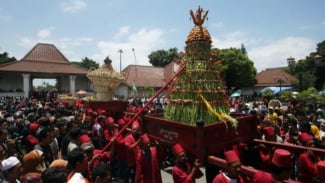Kolintang Becomes Indonesia's 16th UNESCO Intangible Cultural Heritage
- Tangkapan layar instagram/putradwii
Jakarta, VIVA – Kolintang, a traditional musical instrument from Minahasa, North Sulawesi, has officially been recognized as part of the Representative List of the Intangible Cultural Heritage of Humanity by UNESCO.
The announcement was made during the 19th session of the Intergovernmental Committee for the Safeguarding of the Intangible Cultural Heritage in Paraguay on Thursday (Dec 5).
Minister of Culture, Fadli Zon, expressed his appreciation in a speech to all parties who contributed to this achievement.
"Kolintang isn't merely a musical instrument; it is a symbol of harmony, unity, and creativity of the Indonesian people. This recognition is a testament to our shared commitment to preserving the nation's cultural wealth," Minister Zon stated.
This recognition also reflects the cross-cultural values of Kolintang, which is considered similar to the Balafon, a traditional musical instrument from Mali, Burkina Faso, and Côte d’Ivoire in West Africa.
Indonesia's collaboration with these three countries proves that traditional music can bridge geographical and cultural differences.
"Although originating from different traditions, Kolintang and Balafon demonstrate that music is a universal language that can unite us in shared rhythm and creativity amidst diversity," the minister said.
Minister Zon also expressed his respect and pride for the entire Kolintang community in Indonesia, from musicians and artisans to cultural practitioners who have worked tirelessly to sustain this musical instrument.
"We are grateful for the dedication in ensuring that Kolintang remains vibrant and continues to inspire future generations," he added.
UNESCO's recognition brings a great responsibility to continue preserving and promoting Kolintang on both national and international stages.
Menteri Kebudayaan Fadli Zon
- VIVA.co.id/M Ali Wafa
Minister Zon emphasized that this cultural heritage should serve as a bridge for intercultural dialogue and a connection between generations.
"We hope this recognition will raise global awareness of the importance of intangible cultural heritage and strengthen cross-country collaboration in preserving Kolintang and Balafon," he remarked.
As known, Kolintang's recognition encompasses five key domains of Intangible Cultural Heritage, including oral traditions, performing arts, social practices and rituals, ecological knowledge, and traditional craftsmanship.



































